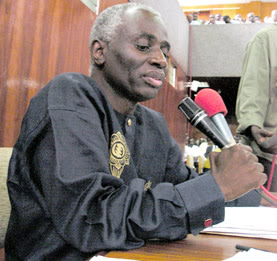 The Supreme Court on Tuesday adjourned to October 30, an appeal filed by Tsatsu Tsikata, a Former Chief Executive of the Ghana National Petroleum Corporation (GNPC), against the Court of Appeal's judgement.In its judgement among others, the Court of Appeal upheld the trial court's (Fast Track Court) failure to compel the attendance of the Country Director of the International Finance Corporation (IFC) as a witness for the Defence (Tsatsu).When the case was called on Tuesday, Major Rowland S. Agbenato (rtd), one of the Defence Team, told the five-member panel, presided over by Mr. Justice William A. Atuguba that the applicant was served on a short notice - on Friday, July 20 at about 1043 hours.Counsel stated: "Sub-Rule 5 does not dispense with the 14 days", adding that the rule was valid on the period of service. Mrs. Gertrude Aikins, representing the Republic, explained Section 2(5) of the rule, and said: "The court may hear cases not listed on notice the board, but may appear before the court through the office of the Registrar".The court noted that the '14 days' was related to the publication in the gazette and that the period and place of publication moved together.The Court then announced the adjournment for the process in respect of hearing and submissions to start on that date, when the applicant would file his grounds for the reply by Respondent. Other members of the panel were Mr. Justice Steve A. Brobbey, Mr. Justice Julius Ansah, Mr. Justice R.T. Aninakwa and Mrs. Justice Sophia O. Adinyira.Professor E.V.O. Dankwa is leading the Defence Team.Tsatsu, dissatisfied with the decision contained in the judgment of the Court of Appeal, which sat on December 19, 2006, had appealed to the Supreme Court.The decision was that the Court of Appeal misconstrued the provision in the Legislative Notification (LN) 9, 1958 Schedule, Article VI, Section 8 of the IFC Article of Agreement as providing immunity to the current Country Director of the IFC from being summoned to give evidence, even though the testimony being sought by the Defence did not relate to acts of the Country Director performing in the official capacity of the Country Director.The Court of Appeal, in upholding the trial court's decision, erred in failing to recognize and enforce the fundamental human right of the accused as expressed in clear mandatory language in Article 19(2)(g) of the 1992 Constitution.This was explained as: "To obtain the attendance and carry out the examination of witness to testify on the same conditions as those applicable to witnesses called by the Prosecution". The Court of Appeal misinterpreted the statutory provisions in respect of the immunity of the International Finance Corporation.The Court of Appeal in dismissing Tsatsu's appeal, stated further that the motion to join the IFC to the appeal challenging the lower court's decision not to call the IFC to testify was not grounded on any rule.Tsatsu is accused in the substantive trial at the Fast Track High Court (FTC) of willfully causing financial loss of 2.3 billion cedis to the State.The accused is also charged on four counts of causing financial loss and intentionally misapplying funds totaling 2.345 billion cedis, property of the State.The offence, according to the Prosecution is contrary to Section 1(2) of the Public Property Protection Decree 1977 (SMCD140). Tsatsu has denied the charges and has been admitted to a 700 million-cedi self-recognisance bail.Mrs. Gertrude Aikins had earlier told the Fast Track Court, Tsatsu had caused financial loss to the State through a loan he, on behalf of the GNPC, guaranteed for Valley Farms.Valley Farms contracted the loan from Caisse Francaise de Development in 1991, but defaulted in the payment, compelling the GNPC, which acted as the guarantor, to pay in 1996.
The Supreme Court on Tuesday adjourned to October 30, an appeal filed by Tsatsu Tsikata, a Former Chief Executive of the Ghana National Petroleum Corporation (GNPC), against the Court of Appeal's judgement.In its judgement among others, the Court of Appeal upheld the trial court's (Fast Track Court) failure to compel the attendance of the Country Director of the International Finance Corporation (IFC) as a witness for the Defence (Tsatsu).When the case was called on Tuesday, Major Rowland S. Agbenato (rtd), one of the Defence Team, told the five-member panel, presided over by Mr. Justice William A. Atuguba that the applicant was served on a short notice - on Friday, July 20 at about 1043 hours.Counsel stated: "Sub-Rule 5 does not dispense with the 14 days", adding that the rule was valid on the period of service. Mrs. Gertrude Aikins, representing the Republic, explained Section 2(5) of the rule, and said: "The court may hear cases not listed on notice the board, but may appear before the court through the office of the Registrar".The court noted that the '14 days' was related to the publication in the gazette and that the period and place of publication moved together.The Court then announced the adjournment for the process in respect of hearing and submissions to start on that date, when the applicant would file his grounds for the reply by Respondent. Other members of the panel were Mr. Justice Steve A. Brobbey, Mr. Justice Julius Ansah, Mr. Justice R.T. Aninakwa and Mrs. Justice Sophia O. Adinyira.Professor E.V.O. Dankwa is leading the Defence Team.Tsatsu, dissatisfied with the decision contained in the judgment of the Court of Appeal, which sat on December 19, 2006, had appealed to the Supreme Court.The decision was that the Court of Appeal misconstrued the provision in the Legislative Notification (LN) 9, 1958 Schedule, Article VI, Section 8 of the IFC Article of Agreement as providing immunity to the current Country Director of the IFC from being summoned to give evidence, even though the testimony being sought by the Defence did not relate to acts of the Country Director performing in the official capacity of the Country Director.The Court of Appeal, in upholding the trial court's decision, erred in failing to recognize and enforce the fundamental human right of the accused as expressed in clear mandatory language in Article 19(2)(g) of the 1992 Constitution.This was explained as: "To obtain the attendance and carry out the examination of witness to testify on the same conditions as those applicable to witnesses called by the Prosecution". The Court of Appeal misinterpreted the statutory provisions in respect of the immunity of the International Finance Corporation.The Court of Appeal in dismissing Tsatsu's appeal, stated further that the motion to join the IFC to the appeal challenging the lower court's decision not to call the IFC to testify was not grounded on any rule.Tsatsu is accused in the substantive trial at the Fast Track High Court (FTC) of willfully causing financial loss of 2.3 billion cedis to the State.The accused is also charged on four counts of causing financial loss and intentionally misapplying funds totaling 2.345 billion cedis, property of the State.The offence, according to the Prosecution is contrary to Section 1(2) of the Public Property Protection Decree 1977 (SMCD140). Tsatsu has denied the charges and has been admitted to a 700 million-cedi self-recognisance bail.Mrs. Gertrude Aikins had earlier told the Fast Track Court, Tsatsu had caused financial loss to the State through a loan he, on behalf of the GNPC, guaranteed for Valley Farms.Valley Farms contracted the loan from Caisse Francaise de Development in 1991, but defaulted in the payment, compelling the GNPC, which acted as the guarantor, to pay in 1996.Source:GNA










